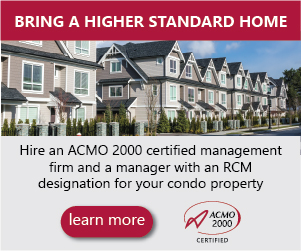
What happens when a condominium manager becomes a condominium owner?
I would never buy a condo! How many times have I heard my colleagues in condominium management say this? How many times did I say it myself until recently, I did just that.
The reasons for my change of heart were familiar to many of my board members. As a recent empty nester, I wanted to downsize in a few years, stay in my neighbourhood and earn rental income on my investment until then. I also did not have a lot of money for a down payment. I sure didn’t want to worry about lawn or exterior maintenance. Upon retirement I never want to hear the words “my eavestroughs are leaking” again! Much to my surprise, I realized what I wanted was a condominium.
Over my career, I have prepared countless status certificates. Surely obtaining a status certificate and relying on it to decide if my large financial investment was sound and relatively risk-free was no big deal for a seasoned veteran like me? In fact, it was a very big deal and much more stressful than I ever envisioned when I was the one preparing them.
The experience made me think about status certificates from a different perspective. As an industry veteran, I requested and reviewed minutes from recent board meetings, the last annual general meeting and the most recent monthly financial statement in addition to the status certificate. Most purchasers just have the status certificate.
Much has been written about the need to educate purchasers and real estate vendors about condominiums. However, I continue to speak to new owners who did not understand what their status certificate was trying to tell them. This leads to unhappy owners and by association, unhappy property managers and directors. Could part of the problem be the actual status certificate format and process?
I have always subscribed to the less is more theory when completing a status certificate. I provide the required information in the prescribed form and I do my best not to vary from it. The widely reported repercussions when a property manager added the unnecessary and incorrect statement “there are no continuing violations of the declaration, bylaws and/or rules of the Corporation” confirmed to me I was on the right track.
I want to ensure there are no incorrect statements that could have negative repercussions for the condominium corporation, my employer and me. I also do not want to unduly interfere in an owner’s real estate sale by including speculative or unrequired information. However, as a condominium purchaser, I wanted my status certificate to include all possible information about anything that could lead to an increase in my fees or a special assessment.
For a “prescribed form” over the years I have seen widely different approaches to completing a status certificate. There are five types of condominium corporations and one status certificate form. The oft-repeated instruction to “strike out whichever is not applicable” can lead some to renumber and rephrase the paragraphs instead of using the existing language. This greatly increases the risk of mistakes. For example, paragraph 6 cross references paragraph 10 and renumbering obscures the meaning. It is also too easy to accidently delete a paragraph entirely.
Even after the above referenced Orr v MTCC 1056 not everyone agrees limiting extraneous information in a status certificate is the best approach. A recent newspaper article recommends disclosing in paragraph 12 the existence of Kitec plumbing in a building even if there is no imminent risk of failure*. This highlights the problem of knowing what to disclose in a status certificate.
The intent of paragraph 12 is to give potential purchasers the particulars of any circumstance that may result in an increase in the common element fees for the unit including a special assessment. Many things “may” happen over many years. I generally add the disclaimer “The Corporation has no knowledge of any circumstances that may result in an increase in the common expense except for any unexpected operating or reserve expenses”. As a purchaser, I found a similar statement in paragraph 12 of my certificate less than reassuring.
Why all the confusion? Section 76 (Status Certificate) of the Act is silent on paragraph 12. My general rule of thumb is to include anything that could reasonably result in a special assessment (in the near future) or an increase in the common element fees (in the current year budget). If it has been minuted at a board meeting, discussed at an AGM, a written report has been generated, or the issue has been otherwise documented, it should be noted in paragraph 12. To me the key is “documented”. There must be something in writing that will back up the information on the status certificate. Otherwise it is just speculation.
It is always a good idea to have the board of directors review a current status certificate at a board meeting. The corporation lawyer should also periodically review status certificates. This is particularly important if the corporation is facing some challenging issues as your lawyer can clarify if and how to disclose them
Protecting condominium owners starts with the status certificate. Bill 106 has many additions and revisions to Section 72 (Disclosure Statement) to prevent owners from being surprised by unexpected costs after purchasing a newly built condo. The purchasers of existing condominiums will be disappointed if they expect much in the way of new protections under Bill 106.
The regulations for most of the changes in Bill 106 are yet to be drafted. This is when the “prescribed forms” will be addressed. I hope it is not too late for some frank discussion about a much needed update of the current status certificate form.
certificate form. *“Kitec plumbing in condos should be revealed”, Bob Aaron, Toronto Star, January 14, 2017.
Deborah Bechard, RCM, is a property manager with Condos Plus Property Management in London, Ontario. She is also a first-time condominium owner.



